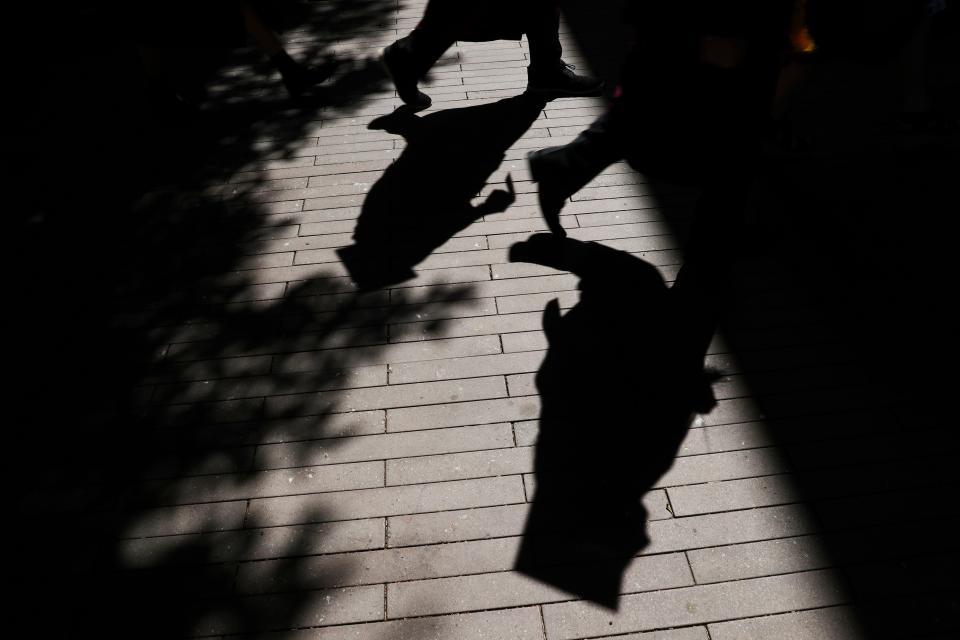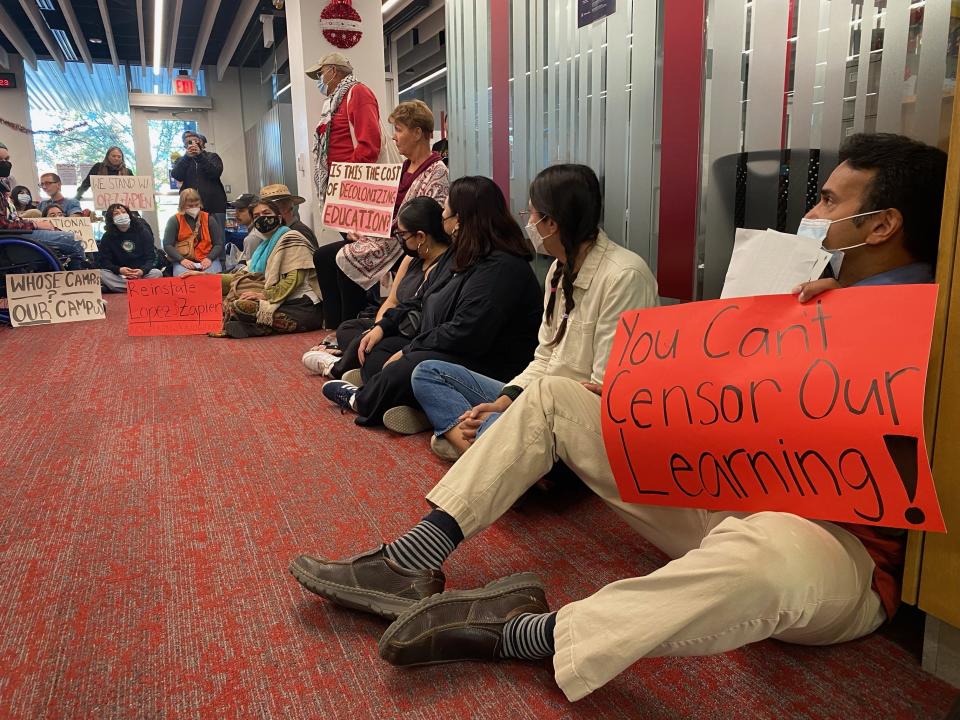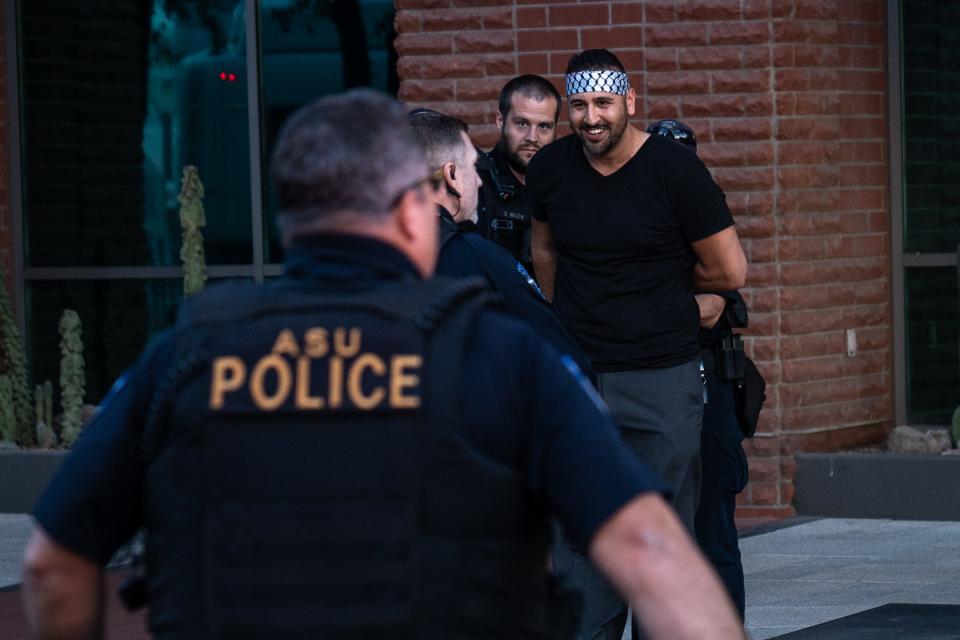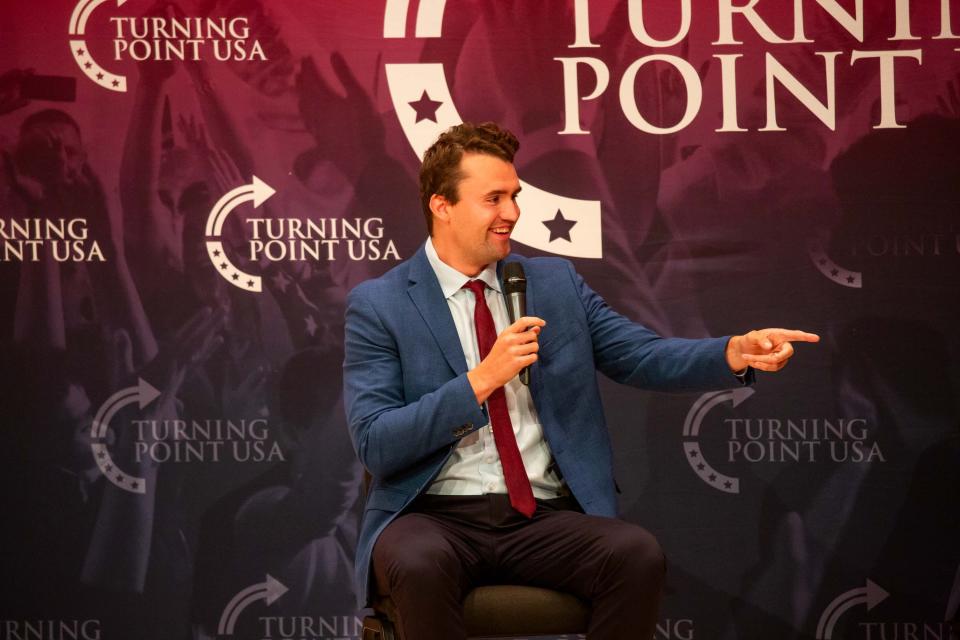As new semester dawns, Arizona universities face questions on faculty safety, speech
Corrections & Clarifications: An earlier version of this article gave an incorrect title for Kristin Gilger, a professor emerita and former dean at ASU's Walter Cronkite School of Journalism.
In October, a queer writing instructor at Arizona State University was followed, confronted and injured by two activists working for the conservative organization Turning Point USA. The instructor was on the group's "Professor Watchlist," a self-described online list of "professors who discriminate against conservative students and advance leftist propaganda in the classroom."
In November, two UA faculty members were temporarily suspended from their jobs for a series of lecture comments in which they denied Hamas is a terrorist organization and likened the group to an American resistance movement. Their comments went viral on social media.
It's far from the first time campus administrators are facing questions of faculty safety. At the University of Arizona, a professor was murdered in October 2022 by a disgruntled former graduate student. The student sent several faculty members racist and antisemitic comments for more than a year before the murder.
But universities are increasingly facing security problems as digital harassment plays out in the real world. The trend is partly fueled by intense political polarization — particularly in Arizona, a swing state bracing for a tumultuous election year.
Some Republican state lawmakers have recently threatened to cut funding for public universities, alleging that conservative voices are routinely silenced on campus. Sen. Anthony Kern, R-Glendale, said in November that he and other legislators were working on bills to put "guardrails" around the Arizona Board of Regents, which governs the schools.

"Part of the nature of universities is to be a venue for divisive voices sometimes and to make people think by offering different opinions," said Drew Neckar of Security Advisors Consulting Group, which offers security consulting to health care institutions, K-12 schools, universities and businesses. "And just because of the nature of that, they are susceptible to things like this."
Ultimately, experts say universities must balance free speech and expression with concerns about faculty safety and academic freedom. But as a new semester begins, conversations with professors, security experts and university officials suggest there are no easy decisions ahead.
"It's hard to be prepared for," said Kristin Gilger, a professor emerita and former dean at ASU's Walter Cronkite School of Journalism. Gilger is a former deputy managing editor for The Arizona Republic. "These are very individualized and personalized attacks."

Different faculty have different views on how to alleviate safety concerns.
Leila Hudson, an associate professor of Middle Eastern studies and the head of UA's Faculty Senate, envisions stronger campus codes of conduct that could dissuade students and fellow faculty from doxxing professors or leaking classroom recordings online.
She said a task force with trained facilitators could also help faculty navigate disputes and controversial topics while promoting "more speech rather than less."
"If you find yourself in one of these escalating and potentially very uncomfortable workplace or classroom or campus situations with people that you need to work with, you would have resources that you could call upon to facilitate more conversation without it becoming a surveillance and monitoring type situation," she said.
Others argue universities must take action against groups that pose threats to faculty.
Some ASU faculty say Turning Point USA needs to be banned entirely from campus after its activists were charged with misdemeanors stemming from the October incident in Tempe — a move First Amendment experts say would almost certainly be unconstitutional.
"I think it's time to start asking the question of whether or not we need to be giving university resources to an organization that is threatening and ultimately doing violence to faculty members on campus," said Alex Young, who teaches American literature and culture at ASU's Barrett Honors College.
Many other faculty are simply staying quiet. The Republic contacted nearly 30 professors on Turning Point USA's watchlist for this story. Only a handful agreed to be quoted.
About 10 other faculty members told The Republic that they would not speak on the record for fear of harassment by Turning Point USA, reprisal by ASU officials, or both. A few declined to speak for other reasons, and the rest never responded to The Republic's request.
Several UA and Northern Arizona University faculty also did not respond to requests for comment or declined to speak.

Universities point to threat management teams, other safety options
Officials at ASU and UA said their schools offer a plethora of safety resources to faculty and staff.
At ASU, employees can access security assessments and request assistance through the university's threat assessment and management team, officials said. The group is tasked with addressing safety concerns and also reaches out to employees if it becomes aware of a security issue.
ASU officials said the team can connect faculty with law enforcement and counseling. It can also address security issues by allowing faculty members to work from home and making unavailable online certain information, such as a professors' email address or phone number.
The school offers real-time security alerts through LiveSafe, a mobile app broadly available to the campus community. It also operates a phone and online hotline that allows anonymous reports.
ASU officials also offer university-wide security trainings on drug recognition, self-defense and international student safety, among other topics.
ASU Provost Nancy Gonzales said the university is developing additional training tailored to the October incident involving Turning Point USA.
"Many of our resources have been enhanced over the last year, and we expect to continue to expand the training and resources available, especially as we learn of additional or changing needs," she said.
UA in May created an Office of Public Safety to unify the oversight of several university departments, including the university's Police Department, facilities management, risk management, emergency management and parking and transportation services.
The goal of the office is to "protect and advance the safety" of the UA community, according to the office's website, which links to safety resources and updates, safety improvements and safety updates.
The school added new emergency locks and intercoms that connect classrooms directly to emergency services. It updated its emergency notification system, established mandatory active shooter training for all employees and started a new campus safety commission made up of faculty, staff, students and community members.
It also revamped its threat assessment and management team, a multidisciplinary group of university employees and contractors who work to assess the threat of violence. Students, faculty and staff can report threat concerns to the team.
UA spokesperson Pam Scott said the school's new Office of Public Safety regularly meets with university departments for training, planning and to address concerns. It intends to use that communication network to keep abreast of any new issues heading into 2024.
"As a public university, we have both the obligation and the opportunity to support free speech and open dialogue," Scott said. "We know there will be discussions, debates and demonstrations on campus. Our goal is to help ensure our students and others can exercise their First Amendment rights in a safe and civil environment."

Could ASU ban Turning Point USA?
Faculty members seeking to ban Turning Point USA say the group must face consequences after its affiliates' October altercation with a queer professor on campus.
"I think we're at a place where the conversation can't just be about the resources available to help us deal with threats, but addressing the organization that is bringing down all these threats and harassment and ultimately violence on ASU faculty right now," said Young, the Barrett Honors College American literature and culture professor. "And that organization is Turning Point USA."
Faculty in support of the move say a ban would entail unregistering the group's affiliated student organization at ASU. They point to the university's student code of conduct and rules for student groups, which indicate a campus organization can be held responsible for the actions of people affiliated with it.
But not all professors are entirely on board with the idea. Michael Ostling, who teaches religious studies at Barrett Honors College, said any ban needs to be "thought through very carefully" and should be "a last resort." Gilger, the Cronkite School of Journalism professor emerita, called the move "a slippery slope."
Meanwhile, Turning Point USA officials said they would fight any such ban and intend to continue operating at the university.
Turning Point USA spokesperson Andrew Kolvet characterized the idea as an effort to "silence conservatives." The organization maintains its activists acted in self-dense during the altercation, and Kolvet said the group aims to engage in "peaceful activism."
"Our goal is to restore conservative free speech on campus, something that has been severely diminished by an overrepresentation of progressive faculty over conservatives, a chasm that has grown more extreme in recent years," Kolvet said. "We believe the answer to bad ideas is more speech, not less."
ASU officials wouldn't comment on the idea of banning the group and a student in charge of the organization's ASU chapter didn't respond to The Republic's request for comment.
Alex Morey, director of campus rights advocacy at the Foundation for Individual Rights and Expression, said previous moves to censor student groups for the actions of their parent organizations have been struck down by courts as unconstitutional.
"There's no suggestion that this particular group did anything untoward, illegal," she said. "For First Amendment purposes, they cannot be silenced just because they're affiliated with a certain group. The law there is pretty clear."
That doesn't mean Turning Point USA is completely immune from consequences, she said.
"If they find that these two TPUSA people were going beyond the bounds of journalism or self-defense, then they should pay the price for that," Morey said. "They should feel the full weight of justice. Same if the professor did something wrong."
The Turning Point USA activists involved in the altercation, Kalen D'Almeida and Braden Joel Ellis, are currently facing misdemeanor charges in the University Lakes Justice Court. They have pleaded not guilty.
Academic freedom?
Ultimately, Morey said faculty have their own right to voice opinions and should feel safe doing so.
"Faculty should not be threatened, physically threatened, ever," she said.
But at ASU, Ostling said many of his colleagues are teaching in fear. Ostling is not tenured and does not have as many job protections as professors who are. He and his non-tenured colleagues worry "a single vocal student either genuinely offended or performing offense in bad faith can lose them their job," he said.
"The playbook of these people who are harassing us is that they stand for free speech," Ostling said. "And I think it's just so important to make it clear over and over and over again that no, they don't. They are, in fact, trying to impede, silence, erase speech that they don't like."
At UA, Hudson said she has heard some colleagues describe the current academic environment as "a kind of new McCarthyism." The problem, she said, transcends just one campus.
"Even in a small lecture class, you don't know who might be listening or recording with the ulterior motive of making your life more difficult because of the speech that you speak," she said. "So that's something that we actually live with, and it's come to a head in this particular moment. It's far from an ideal situation."
Meanwhile, some students say they are starting to notice their professors mincing words on potentially controversial topics.
"I've taken classes that touch upon constitutional issues that may bleed into some more contemporary ones," said Sami Al-Asady, a junior at ASU studying politics and government. "And I've observed faculty who, in reaction to a question that touches upon something very sensitive like abortion or race or something along those controversial social and political lines, often punt or plead the fifth."
Al-Asady, who is a campus scholar with the Foundation for Individual Rights and Expression, said the trend is harmful for conservative and liberal professors alike. A bipartisan right to academic freedom and expression "protects everyone," he said, but eroding that foundation "damages the integrity of the classroom and the learning institution."
"A classroom is a really extraordinary opportunity to just be curious and just be interested in the material without feeling as though you will have retaliation," he said. "The fact that these classrooms aren't operating as they should be is highly problematic for learning outcomes."
Sasha Hupka covers county government and regional issues for The Arizona Republic. She previously reported on higher education. Do you have a tip? Reach her at sasha.hupka@arizonarepublic.com. Follow her on X, formerly Twitter: @SashaHupka. Follow her on Instagram or Threads: @sashahupkasnaps.
This article originally appeared on Arizona Republic: As new semester dawns, universities face questions on faculty safety

